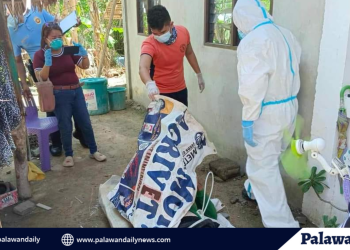The Energy Committee of the Sangguniang Panlalawigan is initially scheduled to organize a business forum this coming Feb. 7 to be attended by all stakeholders in order to tackle the prevailing high cost of fuel in the province.
This was one of the solutions agreed last Tuesday, January 24 when the committee, chaired by Board Member Ryan Mmainta, discussed the matter.
It was attended by the representatives from Department of Energy (DOE), major oil players and other concerned government agencies.
DOE Oil Industry Management Bureau Director (OIMB) director Rino Abad confirmed in a separate interview, that the fuel price in the province is higher compared to other places.
“So, ang suggest ko sa chair ng Energy Committee sa Palawan ay magpatawag tayo ng business forum at sinugest ko rin kanina na magkaroon ng one-on-one [dialogue] with the oil companies. Kasi baka with the extra power po [ng LGU], naiintindihan po natin na iba po ‘yung power ng ng local government mismo kasi nandito sila nagbi-business, so iba po ‘yung pressure na kayang ibigay ng local government, hindi po ng national government lang, ay doon po ay magkaroon ng discussion or explanation sa detalye [sa presyo ng langis]….But unless ma-explain [nila ‘yun], then sobra po ang presyo nu’n,” Abad explained.
Abad urged the members of Energy Committee that the forum should be attended only by the chief executives, the presidents or high ranking officials of all oil companies and not by their representatives so that they could explain on how they derived at their prices.
“Kung ang price ng Manila, for example sa gasoline ay P52 [per liter], tapos dito ay P62, mayroon pong diperensiyang P10. Ngayon, ang analysis po natin, kapag ililipat [ang fuel] galing Batangas papunta rito ay umaabot [ang gastos] na P2.80. So, mayroon pong nangyayaring P7 na diperensiya sa diesel….unless may local cost pang pinag-uusapan, for example, port charges na pwedeng maibawas [pa mula rito],” he added.
IOMB director said, based on their findings that the P2.80 is a combination of the travel cost amounting to P2.50 and 30 centavos value added tax (VAT). With the P7 difference, the Energy Department argues that it is still a high price even the so-called local cost “hypothetically” about P1.50 exists.
“Iyon po ang aalamin sa business forum kasi ang presyuhan na ‘yan ay confidential ‘yung tingin ng oil companies kaya di nila ilalabas. Kaya in fact, kami sa Department of energy, naglabas na kami ng regulasyon [at sinabi namin na] ‘Ilabas n’yo ‘yan para maintindihan namin’ pero na-file-an kami ng kaso. In fact, hindi lang isa, [kundi] tatlong cases with different RTC Branches,” he said.
But when asked by the local media if the oil companies abused their privilege, DOE representative clarified that they are still “giving them benefit of the doubt” until the issue explained during the business forum.
“Again, ang sinasabi lang natin, ‘yang P7 for example sa diesel, kung hindi ‘yan ma-explain, then, there could be no other explanation na medyo mataas ka ng presyo, wala namang ibang interpretation ‘yan na ganansiya ‘yun. But we are not yet concluding, wala pa tayo roon sa one-on-one,” he said.
The Department also says that they are hopeful that the fuel players will not evade the Sanggunian members’ questions during the “one-on-one dialogue.”
“In the face na mayroon tayong deregulation doon sa price but it’s not a license for the oil companies to abuse. Although deregulated sila, sabi nga wala namang kontrol ang government sa price [nila], but kung makita [natin] na sobra na ay hindi naman magandang pabayaan [lang natin],” Abad reiterated.
Advantage of having an import terminal
The DOE and the Committee on Energy members also agreed that they will also invite possible investors for the construction of import terminal or warehouse of fuel during the forum.
“Ang problema kasi kapag mayroon tayong import terminal sa ibang lugar, doon bumabagsak ‘yung mga oil tanker na galing abroad… ‘yung malaking supply at idini-distribute [sa ibang lugar gaya ng Palawan]. Ang problema, ‘pag nag-distribute ka, [may] additional [cost na namang ipapataw] ang tawag diyan, trans-shipment. Ngayon, kung makadidirekta silang Palawan, mabubura ‘yung transshipment cost na ‘yan—‘yung pinag-usapan namin na P2.58, ‘yun ang industry estimate sana galing sa Batangas papuntang Palawan….Malaki na ring bawas [pag nagkataong matuloy ito],” he said.
How would it work?
“Unang-una, ang basic po na requirement diyan ay magkaroon ng jetty—‘yun pong pa-parking-an ng ating tanker at mayroon pong connecting line na hihigupin ‘yung laman ng tanker papuntang storage tank. From that storage tank, mayroon naman tayong gantry—‘yun naman po ang distribution line kung saan dadaan po ‘yung lory truck, ‘yung nakikita n’yo sa kalsada ‘yung tank truck, dadaan po doon at huhulugan naman po ng fuel from the tank,” Abad explained the basic feature of an import terminal and how it works of which they believe that it would be a big help to lessen the prevailing cost of diesel and gasoline in the City of Puerto Princesa and in the Province of Palawan.




















Discussion about this post